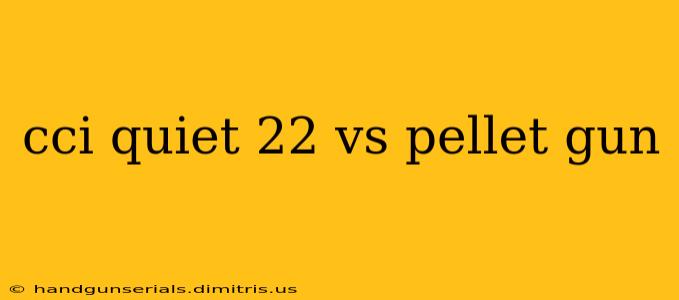Choosing between a CCI Quiet-22 and a pellet gun often comes down to specific needs and preferences. Both offer quiet shooting experiences, but their mechanics, power, accuracy, and overall cost differ significantly. This in-depth comparison will help you decide which is the right choice for your purposes.
Understanding the Differences: CCI Quiet-22 vs. Pellet Gun
The CCI Quiet-22 and pellet guns represent distinct approaches to quiet shooting. Let's break down the key differences:
1. Ammunition and Power:
-
CCI Quiet-22: Uses specially designed .22 Long Rifle cartridges with a subsonic projectile and reduced powder charge. This results in significantly quieter operation than standard .22 LR rounds, but still delivers considerably more power than a pellet gun. The subsonic speed contributes to its reduced noise.
-
Pellet Gun: Fires compressed air or gas to propel lead or other metal pellets. Power varies widely depending on the model, ranging from low-powered air pistols suitable for plinking to high-powered air rifles capable of hunting small game. Generally, pellet guns are less powerful than .22 LR, even the Quiet-22.
2. Accuracy and Range:
-
CCI Quiet-22: While quieter, the Quiet-22 maintains reasonable accuracy at typical plinking ranges (25-50 yards). However, its lower velocity compared to standard .22 LR ammunition may affect long-range accuracy.
-
Pellet Gun: Accuracy in pellet guns depends heavily on the quality of the gun, the type of pellet, and the shooter's skill. High-end air rifles can offer surprising accuracy, but cheaper models often struggle at longer distances. The range is generally shorter than the Quiet-22.
3. Noise Level:
-
CCI Quiet-22: The name says it all; the Quiet-22 is designed for reduced noise. While not completely silent, it's significantly quieter than a standard .22 LR, making it ideal for backyard shooting where noise is a concern.
-
Pellet Gun: Pellet guns are generally quieter than most firearms, but the noise level can vary depending on the power and design. Some higher-powered air rifles can generate a noticeable "whoosh" or "thwack" sound.
4. Cost and Maintenance:
-
CCI Quiet-22: The initial cost of a suitable .22 pistol or rifle is higher than most pellet guns. Ammunition costs are also higher per round compared to pellets. Maintenance involves standard firearm cleaning and care.
-
Pellet Gun: Pellet guns offer a lower initial cost and cheaper ammunition. Maintenance typically involves occasional lubrication and cleaning. However, some more complex airguns might require more specialized maintenance.
5. Legality and Regulations:
-
CCI Quiet-22: Subject to all local, state, and federal firearm regulations. Requires proper licensing and adherence to all applicable laws.
-
Pellet Gun: Regulations vary widely by location. Some areas treat pellet guns as firearms, while others have less restrictive laws. Always check your local regulations before purchasing or using a pellet gun.
Which One Should You Choose?
The best choice depends on your priorities:
-
Choose a CCI Quiet-22 if: You need more power, longer range, and are comfortable with firearm ownership and regulations. You're willing to pay more for the ammunition and the firearm itself.
-
Choose a pellet gun if: You prioritize lower cost, simpler operation, and quieter operation (depending on the model), and the laws in your area are less restrictive regarding air guns. You are primarily interested in plinking or target shooting at closer ranges.
This comparison provides a clear overview of the key distinctions between the CCI Quiet-22 and pellet guns. Carefully consider your specific needs and preferences before making your decision. Remember to always prioritize safety and adhere to all applicable laws and regulations regarding firearm and airgun ownership and use.

